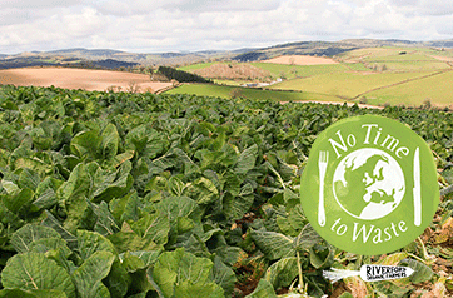Perhaps the worst thing about wasting food is the contempt it shows for the planet that produced it. An abiding memory of my father will be his 90-year-old bottom upended while skip-diving for waste veg for his supper.
I was always trying to persuade him to take some of the fresh stuff, but his parsimonious pleasure in eating what others rejected grew with age. Some measure their success by what they control and consume; he was the opposite. His final, increasingly eccentric years set an example that I admire more as I age myself.
Most of us (Riverford customers at least) hate waste; some of us are willing to accept imperfection to avoid it, and a few even cherish the irregularity that nature lends to our food. Yet supermarkets are sterile, uniform places, and produce must match their strict specifications.
Any cauli under 11cm, any courgette over 14cm, any Little Gem under 130g, any misshapen carrot or blemished potato, any sign of a slug, aphid or caterpillar; all are rendered worthless. Short-lived, headline-grabbing campaigns on wonky veg do little to drive a lasting reduction in waste.
Riverford does have specifications – but we invite growers to help us write them, to challenge them, and to ask for exemptions when a crop struggles to meet them. Our guidance is based on eating quality rather than cosmetics, and on you not having to spend ages trimming around bruised potatoes or carrot fly damage.

I check what goes in the waste trailer, and challenge the team if I think they are being too harsh – but almost invariably they get the balance right. What isn’t quite good enough for veg boxes is used in our canteen and restaurant, given to co-owners, donated to Food in Community or FoodCycle (fantastic local charities), and lastly, fed to the cows – or the compost heap, if we are worried about alliums tainting the milk.
Although there is virtually no ‘waste’, it is worth considering that waste in the field comes at a very low environmental cost, returned to the soil from whence it came. By the time it has been picked, graded, packed, stored and transported, its environmental impact has multiplied by about six, even before the impact of disposal; worst of all is cooking too much and scraping it into the bin.
 Our new campaign, No Time to Waste, is on a mission to reduce food waste at home. We’ll be sharing tips, recipes and more on all our channels, plus a weekly challenge, No Waste Wednesdays, on our Facebook group Riverford Hive. Join us.
Our new campaign, No Time to Waste, is on a mission to reduce food waste at home. We’ll be sharing tips, recipes and more on all our channels, plus a weekly challenge, No Waste Wednesdays, on our Facebook group Riverford Hive. Join us.












Jennyh
It will be interesting to see as Brexit rules bed in, what will happen about our ‘just in time’ food deliveries from the continent. Food scarcity is just about to arrive. Hope you are not part of it Riverford!
Terribly sorry with the lateness of this comment but on rereading Guys comments above and the mention of feeding field waste to cows reminds me of the terrible waste caused by the government a while back.
That of course is feeding waste food to pigs, without which we would have had an even harder time getting through the Second World War. Durig that time and for a while afterwards any kitchen waste etc was collected and fed to the local pigs thus saving space on sorely needed merchant ships for other useful things. It seems that certain diseases have been blamed on feeding so called commercial waste to pigs – i.e. kitchen waste. Amongst others the Foot and Mouth outbreak of 2001 has been blamed on this. Sadly it seems that in accordance with government guidelines the modern farmer is incapable of seperating food waste that is bad for farm animals (especially pigs). This being generally other animal waste i.e. eggs, fish, dairy etc. Funnily enough they were perfectly capable of doing this during and for a time afterwards, especially considering other things were going on in peoples lives. I find this rather amazing considering that this strange turn of events has, it appears, only happened since politicians entered the fray – yet again the politician sticks his “snout” into something he knows little about (other than how to load his plate with as much free produce as he can.
Is it not time that a further study is made of the subject so that the pile of food waste is reduced before it becomes waste – this of course will benefit the pig, people and eventually the planet!
Oh sorry, you have less control over people allowing them to be sensible . . . . .